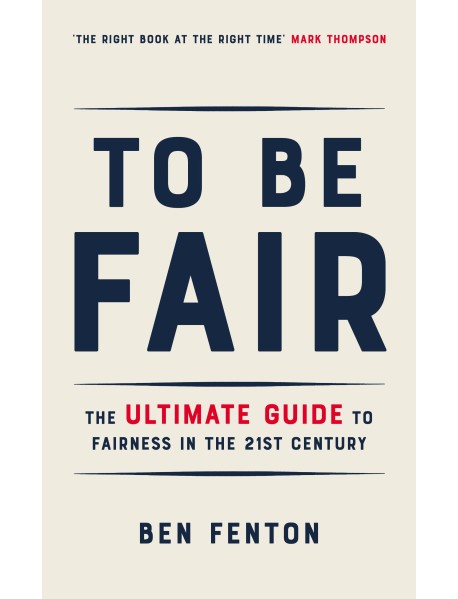To Be Fair

-
28.35 €
-+
"Ben"s book is an elegant and essential intervention in an era of enervating culture wars. It asks and answers nothing less than the most important question of our time: how can we recover the ability to talk to one another?" - Sathnam Sanghera, author of Empireland
What does it mean to be fair? Why do we feel unfairness so strongly? What has happened to us today that we spend more time condemning each other"s views than giving each other a fair hearing?
The idea of fairness is one of the most commonly-expressed concepts, yet nobody ever stops to think what it really means. We all simply take the word "fair" for granted.
In this polemical guide to fairness, Ben Fenton explains the meaning of the word, how it fits into our genetic make-up and why we need our innate sense of fair play now more than ever.
Fenton explores the idea that the unconscious procedure that humans go through in deciding fairness is the vital balancing act between competition and cooperation, the two driving forces that have made us the super-species of Planet Earth. He describes the neurology, anthropology, psychology, history and future of fairness and looks at how it affects our lives through politics, law, sex, religion, race, sport, business and even war.
As a reporter of thirty years" experience, Fenton brings all his skills to bear in a lively and challenging description of the profound inner meaning of a throwaway phrase and why it matters so much to every single person in the world to seek To Be Fair.
PART I - WHY SHOULD WE TRY TO BE FAIR?
1. Why You Should Read This Book
2. The Principles of Fairness
3. The Neurology and Psychology of Fairness
4. Fairness in History
5. Is Fairness a Creation of the English speaking World? (Spoiler alert: No)
PART II - WHAT DOES FAIRNESS LOOK LIKE IN THE MODERN WORLD?
6. Fairness in Sport (and other forms of War)
7. Fairness in Business and Economics
8. Fairness in Law and Taxation
9. Fairness in Communication and Technology
10. Fairness in Politics and Government
11. Fairness in Human Relationships
12. Is Fair Play the Answer to the Ultimate Question?
What does it mean to be fair? Why do we feel unfairness so strongly? What has happened to us today that we spend more time condemning each other"s views than giving each other a fair hearing?
The idea of fairness is one of the most commonly-expressed concepts, yet nobody ever stops to think what it really means. We all simply take the word "fair" for granted.
In this polemical guide to fairness, Ben Fenton explains the meaning of the word, how it fits into our genetic make-up and why we need our innate sense of fair play now more than ever.
Fenton explores the idea that the unconscious procedure that humans go through in deciding fairness is the vital balancing act between competition and cooperation, the two driving forces that have made us the super-species of Planet Earth. He describes the neurology, anthropology, psychology, history and future of fairness and looks at how it affects our lives through politics, law, sex, religion, race, sport, business and even war.
As a reporter of thirty years" experience, Fenton brings all his skills to bear in a lively and challenging description of the profound inner meaning of a throwaway phrase and why it matters so much to every single person in the world to seek To Be Fair.
PART I - WHY SHOULD WE TRY TO BE FAIR?
1. Why You Should Read This Book
2. The Principles of Fairness
3. The Neurology and Psychology of Fairness
4. Fairness in History
5. Is Fairness a Creation of the English speaking World? (Spoiler alert: No)
PART II - WHAT DOES FAIRNESS LOOK LIKE IN THE MODERN WORLD?
6. Fairness in Sport (and other forms of War)
7. Fairness in Business and Economics
8. Fairness in Law and Taxation
9. Fairness in Communication and Technology
10. Fairness in Politics and Government
11. Fairness in Human Relationships
12. Is Fair Play the Answer to the Ultimate Question?
8.66 €

